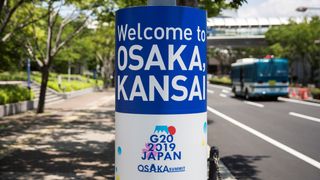For President Trump, there is no more important international meeting in his presidency than this weekend’s G20 summit in Osaka. For a man who has mastered “the art of the deal”, he's regularly come up empty-handed in the trade wars. He has blown up NATO meetings, trashed the Trans-Pacific Partnership, pulled the United States out of the Iran nuclear deal, launched tariff wars with Europe, Japan, China, Mexico and Canada, endured a failed summit with Kim Jong Un in Hanoi, suffered a breakdown in trade talks with China, and has still not produced his peace plan for Israel and Palestine.
This G20 summit is suddenly exquisitely timed for Trump to end the current phase of confrontation and incoherence in foreign policy, and get back on a positive course to resolve three enormously important issues.
Even where he has reached a new agreement, such as the US-Mexico-Canada trade pact, chances of approval by Congress this year are fast receding. It will likely not be in effect by the end of 2019.
But in the midst of this shutout in global diplomacy, and after a week of exceptionally tense brinkmanship with Iran in the Persian Gulf, there is, astonishingly, a major chance for a Trump re-set that could salvage his most crucial foreign policy goals – and aid his re-election. This G20 summit is suddenly exquisitely timed for Trump to end the current phase of confrontation and incoherence in foreign policy, and get back on a positive course to resolve three enormously important issues:
- Iran: At the G20, can Europe open up a diplomatic channel between Washington and Tehran? If there is not to be war, there must be diplomacy – can the European parties to the Iran nuclear deal find a way to begin bringing the two countries into some accommodation? Trump has said repeatedly he wants talks. Establishing a backchannel between Washington and Tehran, together with a stand-down on the military skirmishes, is the only way forward on the nuclear control goals of the United States and the sanctions relief Iran desperately needs.
- US-China trade talks: This may be the last chance for a restart on negotiations. Trump believes he can't lose, that he has more cards to play with Chinese imports than American exports harmed by Chinese retaliation. But such a posture is not conducive to reaching an agreement. Even if the structural trade issues can be resolved – a big 'if' – China wants all tariffs ended if a deal is done. It also wants some relief and access for Huawei. The backdown in Hong Kong is very helpful – it takes a complicated human rights issue off the table. Can Trump and Xi Jinping agree on a process that will enable them to declare victory and head to a safe harbour together later this year?
- US-North Korea talks: Xi was in Pyongyang with Kim this past week, undoubtedly talking about what Kim and Trump both have to work through if substantive and true progress is to be made on dismantling Kim’s nuclear arsenal. Kim received a letter from Trump in the wake of Xi’s visit. Will Xi present a roadmap to Trump on how to get real progress re-started on the nuclear talks?
So little with Trump is strategic; so much is tactical, opportunistic in the short-term and improvised. But what the G20 in Osaka presents is an opportunity for some tactical advances that actually serve long-term US strategic interests. A play on Iran is a truly long shot. It took years for President Obama to find the key to the door for the nuclear negotiations. Untying the trade issues with China is exceptionally complex. The end goal of a nuclear-weapons-free North Korea may well prove elusive.
Nevertheless, Trump’s ability to go to the 2020 election with real foreign policy achievements for the American people may well depend on whether he can pull off a trifecta in Osaka.




